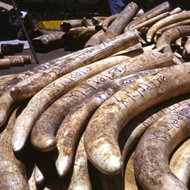
International charity welcomes vote but says funding will be needed
MEPS have voted 647 to 14 in favour of a resolution of wildlife crime in a bid to stop elephant, rhino and tiger poaching, and prevent species from being driven to extinction.
nternational wildlife charity the Born Free Foundation, which helped draft the resolution, has welcome the move but warned it will also need financial back up from the European Parliament.
Will Travers, chief executive of the Born Free Foundation, said: "I am delighted at this development and now hope that the EU will use its considerable power, influence and resources to play a leading role in ending the slaughter and exploitation of the world's wildlife heritage.
"Clearly many developing countries do not have the resources to tackle the issue but with funding and technical assistance I know they are willing to take effective action.
"I am pleased that key forms of wildlife exploitation were included such as the impact of trophy hunting and the live trade in exotic animals as 'pets'.
"Right now my top priority is to see significant resources flow to support the African Elephant Action Plan, a unique blueprint for the survival of Africa's elephants developed and agreed by all the 38 African countries where the species lives.
"The European Parliament has demonstrated its strength of feeling on this issue but now there is an urgent need for action.
“The bottom line is ‘show me the money."
The resolution identified nearly 50 urgent measures that needed to be taken either nationally, across the EU or throughout the world by the international community.
They include:
– Recognition that the EU is a major destination for the importation of illegal wildlife products such as ivory and live animals
– The suspension of all all commercial imports, exports and domestic sales and purchases of tusks and raw and worked ivory products until wild elephant populations are no longer threatened by poaching
– The destruction of stockpiles of illegal ivory
– More resources to catch wildlife criminals and tougher sentencing powers across the EU
– The establishment of a specialised Wildlife Crime Unit within Europol
– Work with African and Asian states to strengthen their law enforcement and develop effective judicial systems to tackle corruption and better combat wildlife crime
– The development of alternative livelihoods for local communities closest to the wildlife concerned and the engagement of those communities in anti-poaching operations
For more on the EU resolutions click here.
For more information about Born Free please visit www.bornfree.org.uk
Image by Born Free Foundation



 The Veterinary Medicines Directorate (VMD) is inviting applications from veterinary students to attend a one-week extramural studies (EMS) placement in July 2026.
The Veterinary Medicines Directorate (VMD) is inviting applications from veterinary students to attend a one-week extramural studies (EMS) placement in July 2026.